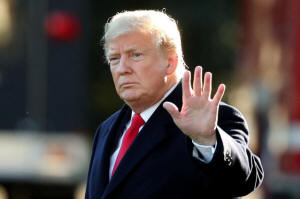|
Worried about iPhone eavesdroppers? China
says Trump may need a Huawei
 Send a link to a friend
Send a link to a friend
 [October 25, 2018]
BEIJING (Reuters) - China's foreign
ministry has some suggestions for the Trump administration if they are
worried about foreign eavesdropping on the U.S. president's iPhone: use
a Huawei handset instead. [October 25, 2018]
BEIJING (Reuters) - China's foreign
ministry has some suggestions for the Trump administration if they are
worried about foreign eavesdropping on the U.S. president's iPhone: use
a Huawei handset instead.
Or just sever ties with the outside world completely.
The riposte came after a New York Times report that Chinese and Russian
spies often secretly listened in on President Donald Trump when he used
his unsecure Apple <AAPL.O> cellphone to gossip with old friends.
"Reading this report, I feel that today in the United States there
really are some people who are doing their utmost to win best script at
the Oscars," Chinese Foreign Ministry spokeswoman Hua Chunying told a
news conference on Thursday.
Such reports were "evidence that the New York Times makes fake news",
she said, adding two suggestions that were apparently aimed at the Trump
administration.
"If they are really very worried about Apple phones being bugged, then
they can change to using Huawei," she said, referring to China's biggest
telecommunications equipment maker.
"If they are still not at ease, then in order to have an entirely secure
device, they can stop using all forms of modern communication devices
and cut off all ties with the outside world."

The Times reported that Trump's aides have repeatedly warned him that
his cellphone calls are not secure, but the president refuses to give
them up.
Huawei Technologies Co Ltd [HWT.UL] has come under scrutiny in the
United States where intelligence agency leaders and others have said
they are concerned that Huawei and other Chinese companies may be
beholden to the Chinese government or ruling Communist Party, raising
the risk of espionage.
The U.S. Democratic National Committee warned party candidates running
in November elections not to use devices from Huawei or ZTE <000063.SZ>,
another major Chinese telecoms gear maker.
The U.S. Department of Defense has stopped selling mobile phones and
modems made by Huawei and ZTE in stores on its military bases, citing
potential security risks.
[to top of second column]
|

President Donald Trump waves prior to departing on a trip to
Wisconsin from the White House in Washington, U.S., October 24,
2018. REUTERS/Cathal McNaughton

And in March, Federal Communications Commission Chairman Ajit Pai
told Congress he shared the concerns of some U.S. lawmakers about
espionage threats from Huawei.
The New York Times cited U.S. officials as saying China had a
sophisticated approach toward the intercepted presidential phone
calls and was seeking to use them to determine what Trump thinks,
whom he listens to and how best to sway him.
Beijing particularly is trying to use what it learns to prevent the
current trade war between the two countries from escalating further,
according to the newspaper.
Concerns have been raised on several occasions this year about
cellphone surveillance activity in the Washington area. The
Department of Homeland Security said in a letter to several senators
in March that it had observed activity in Washington consistent with
mobile subscriber identity catchers.
(Reporting by Christian Shepherd in BEIJING and David Alexander in
WASHINGTON; Writing by John Ruwitch; Editing by Peter Cooney & Simon
Cameron-Moore)
[© 2018 Thomson Reuters. All rights
reserved.]
Copyright 2018 Reuters. All rights reserved. This material may not be published,
broadcast, rewritten or redistributed.
Thompson Reuters is solely responsible for this content.
 |